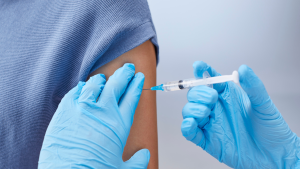
FDA Approves New Version of PrEP—Just Two Shots A Year
The FDA has approved lenacapavir as a form of pre-exposure prophylaxis (PrEP), offering a new option for HIV prevention requiring only two shots per year.

Oral sex is when someone puts their lips, mouth, or tongue on their partner’s penis, clitoris, vulva, vaginal opening, or anus. There are different terms used to describe types of oral sex:
Oral sex is a common sexual practice for people of all genders and sexual orientations. Generally, oral sex is a safe sexual activity, but sexually transmitted infections can be pass on to partner this way.
Yes. Some STIs—including gonorrhea and herpes—can be spread through oral sex. But it’s much less likely to pass on or get an STI from oral sex than from vaginal or anal sex.
You can get an STI of the mouth or throat if you give oral sex to someone who has a genital or anal infection. Fellatio (mouth-to-penis) is the type of oral sex that is most likely to pass on STIs.
You can also get an infection on the genitals or anus if you receive oral sex from a partner who has an STI on their lips or in their mouth or throat.
Some STIs—specifically gonorrhea and herpes—are more likely to be passed on by oral sex than others.
The chance of getting HIV through oral sex is very low. There have been few if any cases of HIV known to be pass on through oral sex.
Most oral STIs cause no symptoms. Syphilis and herpes may first show up as sores on the lips or mouth. Oral gonorrhea may cause a sore throat similar to strep throat, but over 90% of cases have no symptoms.
Testing for oral STIs depends on the infection. It can be done using a swab (like a throat culture), by visual exam or swab of any sores, or through blood tests.
If you have any symptoms—such as sores on your lips or mouth or an otherwise unexplained sore throat—see a health care provider. Be honest about your recent sexual activity. They may or may not decide you need a test.
If you had oral sex with a partner who has been recently diagnosed with an STI, talk to your provider about whether you should get tested.
Screening for people who don’t have any symptoms is based on your sexual behavior and your partners. For example, most providers suggest screening men who have sex with men for gonorrhea of the throat because this infection is common in this group. In contrast, it’s unlikely a provider would suggest gonorrhea screening for anyone who has only given cunnilingus.
Gonorrhea, chlamydia, and syphilis can be cured with antibiotics. It’s important that all partners get treated so you don’t reinfect each other. Ask your provider whether you need follow up testing.
There is no cure for oral or genital herpes infections, but there are treatments that can help limit outbreaks and lessen symptoms.
There is no cure or treatment for oral HPV, but most infections clear up on their own.
The best way to prevent STIs from oral sex is to make sure you and your partners get tested. Many STIs have no symptoms meaning the only way to find out if you have one is to get tested. Testing and treating STIs prevents you from passing them to anyone else.
Using condoms during fellatio can prevent STIs, just like they do with vaginal or anal sex. They even make flavored condoms to make it more fun for the giving partner.
In addition, the HPV vaccine prevents infection with the nine types of HPV that are most likely to cause genital warts and cancer. This includes types that cause cancer of the cervix, genitals, anus, and throat.
Gonorrhea is one of the most common oral STIs. Fellatio is more likely to transmit gonorrhea than cunnilingus or anilingus. It is most likely that someone giving oral sex would get gonorrhea from their partner’s penis. If the giving partner has an infection of the throat, they might pass this to their partner’s penis, but this is less likely. Gonorrhea of the throat is common, especially among men who have sex with men.
Providers often suggest gonorrhea testing of the throat for people who frequently give oral sex to a partner with a penis, especially men who have sex with men. The test uses a throat swab similar to what is used to diagnose strep throat.
Gonorrhea of the throat can be cured with antibiotics. It’s important that all partners take medication to avoid re-infecting each other.
HPV (human papilloma virus) can be transmitted through oral sex from one partner’s genitals to the other partner’s throat or mouth. It is much less likely that HPV would be transmitted from one partner’s mouth or throat to the other partner’s genitals.
Researchers estimate that 7% of the population has oral HPV. Most cases of HPV (oral or genital) resolve on their own, and the person never knows they had it. Some cases lead to cancer, including cancer of the mouth and throat. These types of cancers, however, can occur in people who have never engaged in oral sex.
There are tests for oral HPV infection, but they’re not usually recommended. There is no treatment for oral HPV infection, but most infections go away on their own.
The HPV vaccine prevents infection with the nine types of HPV that are most likely to cause genital warts and cancer. This includes types that cause cancer of the cervix, genitals, anus, and throat.
The bottom line is that oral sex is a generally safe activity that is less likely to pass on STIs than vaginal or anal sex. That said, if you engage in oral sex, it’s a good idea to ask your health care provider if they would recommend any additional STI testing.

The FDA has approved lenacapavir as a form of pre-exposure prophylaxis (PrEP), offering a new option for HIV prevention requiring only two shots per year.

On a recent episode of Love Island, a cast member sugested that we could blame our current STI epidemic on men who had sex with animals. She pointed to koalas with chlamydia as an example. There’s some truth here, but also a lot of misinformation.

A new report from the Centers for Disease Control (CDC) shows that we’re missing opportunities to prevent congenital syphilis and save lives.

There’s potential good news in gonorrhea prevention as a series of studies suggests that certain meningococcal B (MenB) vaccines can reduce the risk of gonorrhea.

There is new guidance on pain management for IUD insertion and acknowledgement that providers often underestimate the pain patients feel during their procedures.

The FDA just approved the Teal Wand, a self-collection device for HPV testing that does not require a speculum exam or even a trip to the doctor’s office. People can collect their own sample at home and send it to a lab for analysis.

The results of large-scale study of HPV suggest that one shot of the vaccine may be enough to protect young people from HPV and related issues like cervical cancer.

About 1.6 million cases of chlamydia and 600,000 cases of gonorrhea are diagnosed in the United Sates each year. A new study suggests that these patients may not be following through with STI treatment or getting the right antibiotics.
ASHA believes that all people have the right to the information and services that will help them to have optimum sexual health. We envision a time when stigma is no longer associated with sexual health and our nation is united in its belief that sexuality is a normal, healthy, and positive aspect of human life.
ABOUT
GET INVOLVED
ASHA WEBSITES
GET HELP
© 2025 American Sexual Health Association